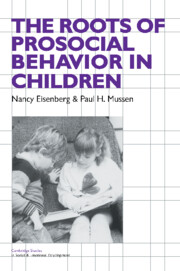Book contents
- Frontmatter
- Contents
- Preface
- 1 Introduction
- 2 Methodological and theoretical considerations in the study of prosocial behavior
- 3 Biology and prosocial behavior
- 4 Culture and prosocial behavior
- 5 “Person” variables and prosocial behavior
- 6 Socialization in the family
- 7 Socialization by agents outside the family
- 8 Cognition, role taking, interpersonal problem solving, and moral judgment
- 9 Emotional factors in prosocial behavior
- 10 Situational determinants
- 11 Conclusions
- References
- Name index
- Subject index
8 - Cognition, role taking, interpersonal problem solving, and moral judgment
Published online by Cambridge University Press: 31 December 2009
- Frontmatter
- Contents
- Preface
- 1 Introduction
- 2 Methodological and theoretical considerations in the study of prosocial behavior
- 3 Biology and prosocial behavior
- 4 Culture and prosocial behavior
- 5 “Person” variables and prosocial behavior
- 6 Socialization in the family
- 7 Socialization by agents outside the family
- 8 Cognition, role taking, interpersonal problem solving, and moral judgment
- 9 Emotional factors in prosocial behavior
- 10 Situational determinants
- 11 Conclusions
- References
- Name index
- Subject index
Summary
Before we help others, act considerately, or donate to charity, we have to perceive and interpret a situation and make inferences about others' feelings. We also evaluate their needs and desires and decide which actions will be most effective and beneficial to them. Finally, we must formulate and execute a plan for prosocial action. In short, mature prosocial action involves several fundamental cognitive processes: perception, reasoning, problem solving, and decision making.
The roles of cognitive processes in the genesis, development, and execution of prosocial behavior are not fully understood. At the earliest stages of cognitive development, children probably are not able to perceive and interpret another individual's needs or distress accurately, nor do they know what to do to help relieve someone else's distress. Hence, they cannot act altruistically. What are the cognitive prerequisites of showing consideration or kindness, of sharing or helping? At what stage of cognitive development does the child become capable of accurate perceptions of someone else's feelings? Are intelligent children more likely than unintelligent children to sympathize with victims of oppression? Does more mature reasoning ability or greater sophistication in resolving moral and social problems lead to stronger tendencies toward prosocial responses? These are the kinds of questions that are examined in this chapter. As we shall see, there have been many relevant investigations, but we do not have many definitive answers.
Most of the pertinent research pertains to six interrelated topics: general intelligence, perception of others' needs, role taking, interpersonal problem solving, attributional inferences (inferences about others: motives and behavior), and moral reasoning or moral judgment.
- Type
- Chapter
- Information
- The Roots of Prosocial Behavior in Children , pp. 108 - 129Publisher: Cambridge University PressPrint publication year: 1989

